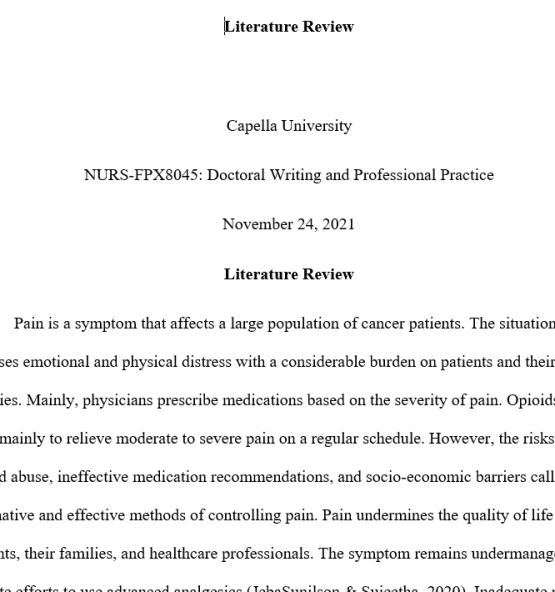


Literature Review
Capella University
NURS-FPX8045: Doctoral Writing and Professional Practice
November 24, 2021
Availability:In Stock
Literature Review
Pain is a symptom that affects a large population of cancer patients. The situation imposes emotional and physical distress with a considerable burden on patients and their families. Mainly, physicians prescribe medications based on the severity of pain. Opioids are used mainly to relieve moderate to severe pain on a regular schedule. However, the risks of opioid abuse, ineffective medication recommendations, and socio-economic barriers call for alternative and effective methods of controlling pain.
Pain undermines the quality of life of patients, their families, and healthcare professionals. The symptom remains undermanaged despite efforts to use advanced analgesics (JebaSunilson & Sujeetha, 2020). Inadequate pain management reveals difficulties related to the patient, healthcare professionals, and the healthcare system. For instance, limited skills and undesirable attitudes expose patients to the risk of worsening pain. Unavailability of medications and disadvantaged socio-economic status are among the challenges that jeopardize effective pain management (JebaSunilson & Sujeetha, 2020). Further, a healthcare facility may lack the right employees and equipment to handle patients’ symptoms.
Healthcare professionals, patients, and families can identify alternative approaches for managing pain to minimize the risk of inadequate practices. Many patients argue that healthcare professionals lack the knowledge required for effective pain management (Kress et al., 2015). Other practitioners may consider pain management as a low-priority area. Further, non-adherence to evidence-based treatment, inadequate prescribing, and failure to utilize psychotherapists’ skills also expose patients to deteriorating symptoms.
In this case, patients can benefit more from interventions that allow them to take charge of their recovery. This review incorporates the themes of pharmacological treatment, pain management, and non-pharmacological interventions to discuss the guidelines for managing cancer pain. The evidence gathered reveals the need for change that helps reduce emotional, physical, and psychological distress among cancer patients experiencing pain. Offering patients the opportunity to participate in clinical decision-making is an important consideration (Kress et al., 2015). The move makes patients more responsive to information about their conditions and pain management strategies.
Reviews
There are no reviews yet.